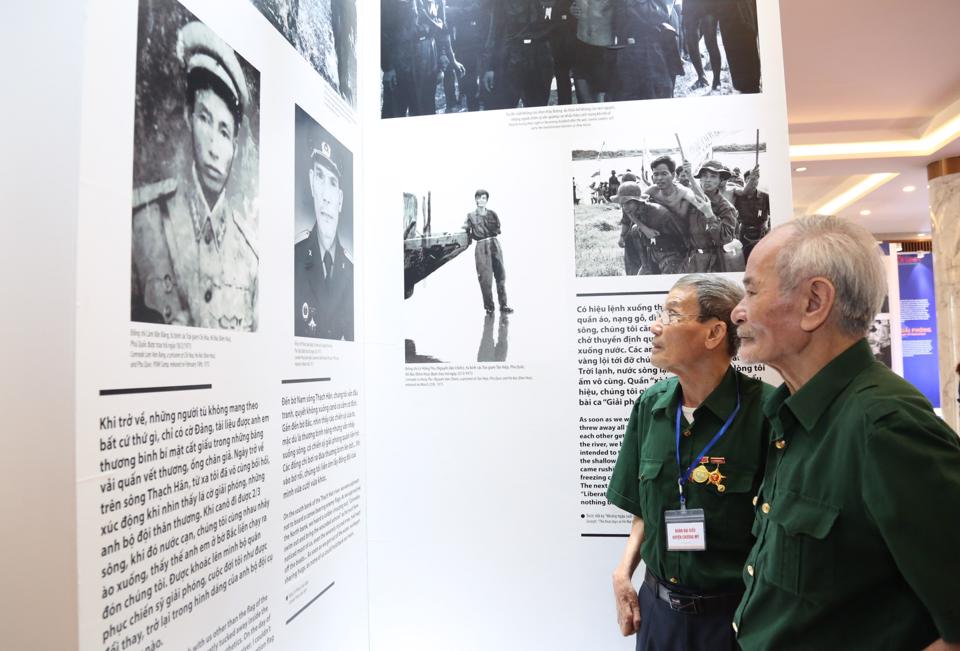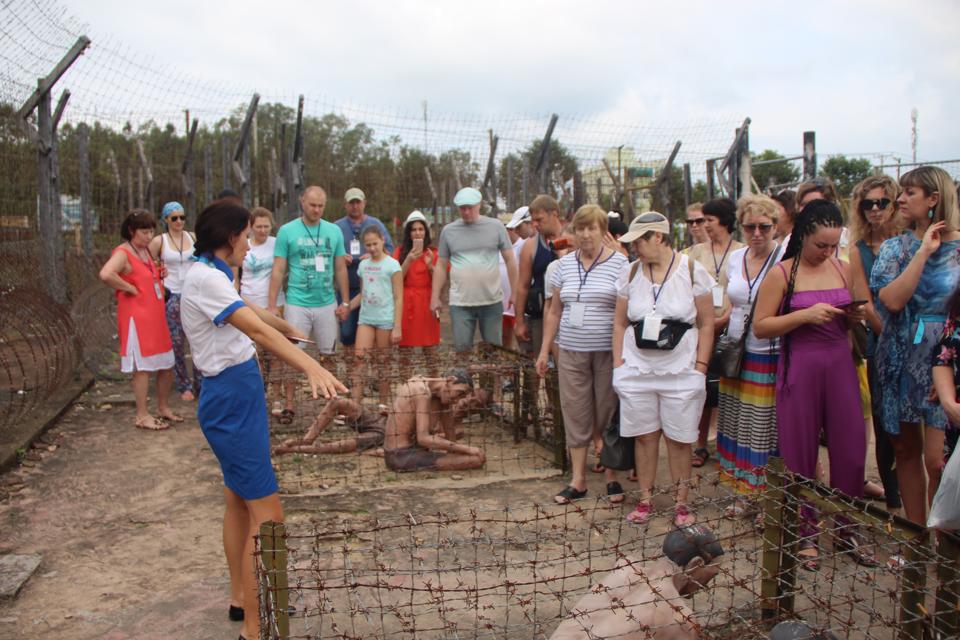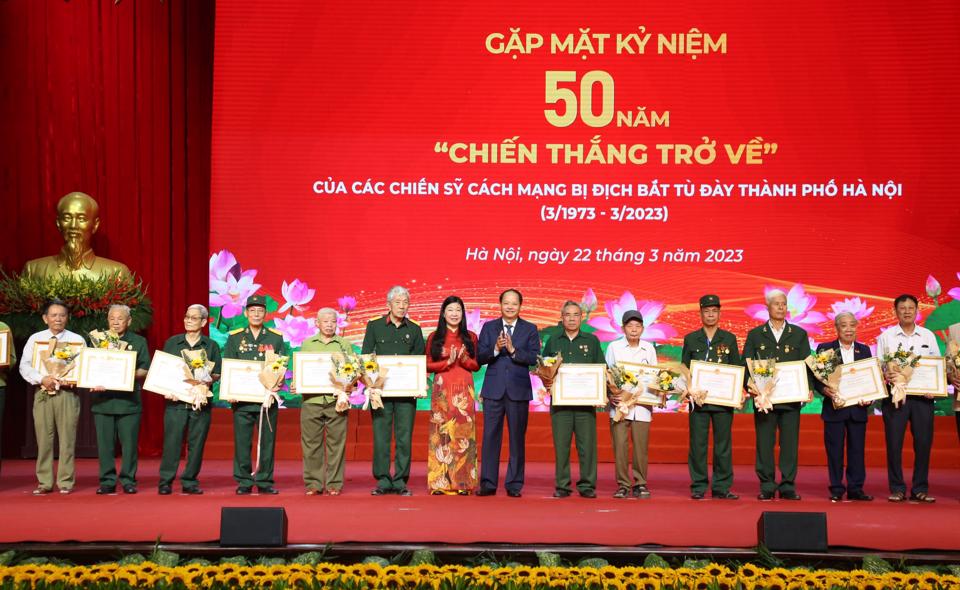Hanoi patriots recount memories of captivity
The sons of Hanoi held their heads high and persevered in the cause of national liberation in the face of brutality and harassment.
The lethal and brutal treatment and torture in Phu Quoc jail could not weaken the determination of the sons of Hanoi to survive and fight for the freedom and independence of their homeland.
| Former Hanoi imprisoned veterans attend a ceremony on March 22 that honors their sacrifices for national unity and liberation. Photo: Thanh Hai/The Hanoi Times |
Phu Quoc Prison was built in 1949-1950 under French colonial rule to detain political dissidents and national patriots.
From 1963 to 1973, more than 40,000 Vietnamese patriots, soldiers, and communist activists who fought for the liberation of their country were incarcerated in the prison, which was run by the South Vietnamese regime.
Located some 90 kilometers from the Vietnamese mainland, Phu Quoc prison was the site of the deaths of some 4,000 people who gave their lives in the hope that their sacrifices would bring a better future for future generations.
Once considered to be one of the six "hells on earth," Phu Quoc Prison had some of the harshest prison conditions that anyone could ever imagine.
The Vietnamese were kept in the dungeon and brutally tortured, said Le Tien, a former Hanoi veteran who was held in Phu Quoc prison.
Recalling his memories in prison, Tien, now a representative of the Hanoi Committee of Imprisoned War Veterans, was proud that the enemy's cold-blooded persecution and harsh psychological treatment could not break his loyalty.
"For us, a day in prison is like an eternity," said Dao Duc Vien, who now lives in Gia Lam District, as he recounted his time in prison.
But even the most severe punishment could not bring down Vietnamese patriots, he insisted.
"As soldiers, we kept the revolutionary oath and swore not to betray or inform on our comrades," said Hoang Van Nham, a prison veteran now living in Phu Xuyen District.
The inhumane treatment and torture could not force the veterans to sit still and remain imprisoned, Vien said.
| Foreign tourists visit Phu Quoc Prison. Photo: Huu Tuan/The Hanoi Times |
He added that activities were carried out to fight for their dignity and honor and to demand better prison conditions for their comrades.
Hunger strikes were among the key methods used by the detained veterans to force their jailers to meet their demands, the veteran said.
Hanoi revolutionary veteran Tien said he and his comrades were firm and loyal to their cause and never thought of surrendering.
"We set up our societies, organized singing and teaching classes in prison to educate each other about our cause," Tien said.
They also learned the will of the late President Ho Chi Minh, did exercises and wrote poems to keep their minds calm and balanced, he recalled.
To pay tribute to President Ho Chi Minh when he died in the fall of 1969, the prisoners also made a flag of the Communist Party of Vietnam and a portrait of President Ho Chi Minh by hand.
Various methods were employed as the imprisoned veterans sought to break out of the prison.
"We cut the fence, hid in the garbage, hid under supply trucks, and dressed up like the guards to escape," Vien said.
"In some of the worst cases, we staged a prison break and forcibly took over the enemy's weapons and vehicles," he added.
"About 300 people escaped from the prison, returned to the resistance bases and continued to fight until the country was liberated," Vien recalled.
Their efforts and willingness were the greatest fear of the puppet authorities and their henchmen, he said.
Moving on
All the communist revolutionaries jailed in Phu Quoc prison were released in March 1973 under the terms of the Paris Peace Accords signed between Vietnam and the US in late January 1973.
| Hanoi imprisoned veterans receive certificates and merits for their efforts that contributed to the socio-economic growth of the capital city. Photo: Thanh Hai/The Hanoi Times |
More than 860 veterans formerly imprisoned on Phu Quoc Island are now living in Hanoi. Despite difficulties, the veterans have made positive contributions to the city's socio-economic development, especially in educational activities and community service.
The Hanoi Committee of Imprisoned War Veterans has published five books entitled "Stalwart and Invincible", and the proceeds from the sale of the books, amounting to hundreds of millions of dong, have been donated to the flood victims.
The imprisoned war veterans also actively participated in developing municipal and local Party committees. Of the total, 46 veterans worked in municipal and local Party committees, and 68 veterans were government officials.
At an event held on March 22 to pay tribute to their sacrifices for the nation, the Hanoi Committee of Imprisoned War Veterans expressed their gratitude to the Party, Government, and Hanoi City authorities for taking good care of their lives.
The veterans' committee pledged to continue participating in Hanoi's socio-economic growth, safeguarding national unity, and contributing to making Hanoi the city of peace and the heart of Vietnam.
Nguyen Thi Tuyen, Deputy Secretary of the Hanoi Party Committee, said the city and its people are forever indebted to the veterans for their efforts during the war.
Paying tribute to the veterans' steadfastness and determination in the face of the enemy, Tuyen said former communist activists and soldiers will always be given priority in the city's welfare policies.
"The authorities and people of Hanoi always pay tribute to the bravery and heroism shown by the veterans in the war, which is the motivation for us to overcome difficulties and develop a civilized, modern, and cultured capital," she said.
"The coming period will be difficult and require the unity of the political and administrative systems. Therefore, we hope to receive your unwavering support for the further development of the capital," she said.













